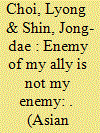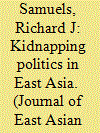| Srl | Item |
| 1 |
ID:
154649


|
|
|
|
|
| Summary/Abstract |
In this article we examine the exceptional case of South Korea's establishment of cooperative relations with Iran, despite the latter's confrontation with the United States, South Korea's closest ally, in the late 1970s and early 1980s. We discuss the conventional idea of the imbalanced relationship—the enemy of my ally is not my enemy—to explain South Korea's approach toward Iran, evaluate its past and current relations, and offer policy suggestions for the future relationship between the two countries. Using newly discovered archival resources and political records from South Korea, we provide a more exact picture of the international relations among South Korea, Iran, and the United States in the early 1980s.
|
|
|
|
|
|
|
|
|
|
|
|
|
|
|
|
| 2 |
ID:
100263


|
|
|
|
|
| Publication |
2010.
|
| Summary/Abstract |
In this article, I examine two contemporary cases in which the same foreign adversary, North Korea (DPRK), violated the sovereignty of neighboring states. I use a comparison of South Korean and Japanese reactions to political captivity to assess institutional performance in democratic states and ways in which these dynamics are connected to international politics. We see how "captivity narratives" can be differentially constructed and deployed and how policy capture can be achieved by determined political actors. Civic groups in both countries worked to mobilize political support, frame the issue for the media, and force policy change. In Japan, politicians were more willing to use the abduction issue for domestic political gain than in Korea, where the political class was determined to prevent human rights issues (including abductions) from interfering with their larger political agenda, including improved relations with the DPRK.
|
|
|
|
|
|
|
|
|
|
|
|
|
|
|
|
| 3 |
ID:
153514


|
|
|
|
|
| Summary/Abstract |
This paper argues that President Park Chung-hee’s rapprochement with the Palestine
Liberation Organization (PLO) prior to a 1979 Middle East diplomacy summit
provides a relevant case for the analysis of South Korean foreign policy within the
framework of its pursuit of autonomy amidst conflicts within the asymmetric ROK–
U.S. alliance. Park was scheduled to visit Saudi Arabia and Kuwait in December
of that year, but the meeting never took place due to the 10.26 incident. Enhancing
autonomy, as opposed to relying solely on the United States for extended deterrence,
was the motivation behind South Korea’s pro-PLO policy, and was considered a
massive bargaining chip for attaining a beneficial outcome at the scheduled summit.
Given this context and the nexus between energy and national security, South
Korea expected its détente with the PLO to help promote national security and a
self-reliant defense policy, while safeguarding a stable supply of oil in the wake of
the second oil crisis. A further incentive for recognizing the PLO was improving
deterrent capability against North Korea through diplomatic diversification beyond
the traditional Cold War bloc. Considering Park’s plan for strategic rapprochement
with the PLO and growing conflict with the Carter administration, it is reasonable
to assume that the purpose behind his planned visit to Saudi Arabia and Kuwait was
to achieve greater autonomy.
|
|
|
|
|
|
|
|
|
|
|
|
|
|
|
|